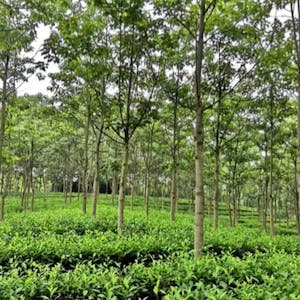Discover the integrated approach of agroforestry with the "Agroforestry I: Principles and Practices" course. This comprehensive program, offered by the University of Florida, delves into the multifunctional benefits of growing trees and crops in interacting combinations, providing sustainable land-use solutions.
The course covers a broad overview of the most current research and best practices in global agroforestry. From understanding the principles and concepts to exploring agroforestry systems in different climatic zones and their impact on ecosystem services and food security, this course equips learners with essential knowledge for sustainable land-use management.
Join this course to enhance your understanding of sustainable land-use practices and contribute to global efforts in agroforestry and environmental conservation.
Certificate Available ✔
Get Started / More Info
This comprehensive course comprises nine modules that cover a wide range of topics, including scientific developments, agroforestry systems in different climatic zones, tree species productivity, soil management, climate change, and ecosystem services. Students will gain in-depth knowledge and practical insights into sustainable land-use management.
Module 1 provides a comprehensive overview of scientific developments in agroforestry. From understanding the principles to the companion textbook, students gain a strong foundation in this integrated approach.
Module 2 delves into the definitions, concepts, and global distribution of agroforestry systems, providing insights into their classification and diverse applications across the world.
Module 3 focuses on agroforestry systems in the tropics and subtropics, exploring their unique characteristics, challenges, and contributions to sustainable land-use practices.
Module 4 explores agroforestry systems in temperate zones, offering a comparative analysis and practical insights into their suitability and impact on land-use management.
Module 5 provides a detailed understanding of agroforestry (tree) species and their productivity, essential for sustainable crop and wood production in agroforestry systems.
Module 6 emphasizes the critical role of soil management in agroforestry, offering practical techniques and insights for maintaining soil quality and fertility within agroforestry systems.
Module 7 delves into the impact of climate change on agroforestry systems, focusing on carbon sequestration, mitigation strategies, and their role in sustainable land-use practices.
Module 8 explores the diverse ecosystem services provided by agroforestry, including biodiversity conservation, climate regulation, and soil quality improvement, highlighting their multifunctional benefits.
Module 9 discusses the role of agroforestry in achieving food security and sustainable development goals, offering insights into its contributions to global efforts in environmental conservation and sustainable land-use management.
This course equips learners with foundational skills to address sustainability challenges and become impactful sustainability analysts in organizations.
This course delves into the history of mass extinctions, their causes, and impact on life on Earth. It also explores the current mass extinction and how to predict...
Mobilités et véhicules électriques - Explorez l'avenir de la mobilité durable et des véhicules électriques à travers une approche multidisciplinaire intégrant...
This course equips learners with the knowledge and skills to navigate national code and zoning rules specific to photovoltaic systems, along with key design elements...